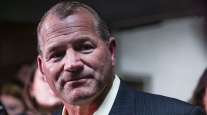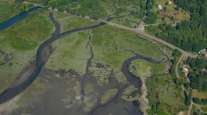Senior Reporter
Trump to Congress: Produce $1.5 Trillion Infrastructure Bill, Streamline Permitting

In his first State of the Union address, President Donald Trump called on the Republican-led Congress to prepare a $1.5 trillion infrastructure bill that would rely heavily on private-sector investments.
Trump added the legislation must also reduce the permitting process for certain infrastructure projects from 10 years to two years to expedite project completions and overcome delays from duplicative reviews.

While the 80-minute speech was billed as an opportunity for Trump’s builder-in-chief reputation to shine, he offered few details for his plan — specifically, how to fund the bill’s $1.5 trillion top-line goal.
Earlier reports indicated the plan would rely on $200 billion in federal funding that would lure enough private investment to compel the 10-year program to its $1.5 trillion mark. Previous reports also noted the plan would provide $25 billion for rural projects.
“Every federal dollar should be leveraged by partnering with state and local governments and, where appropriate, tapping into private-sector investment to permanently fix the infrastructure deficit,” Trump told Congress, his Cabinet, dignitaries and guests from the floor of the House on Jan. 30.
“We can reclaim our building heritage. We will build gleaming new roads, bridges, highways, railways and waterways across our land. And we will do it with American heart, American hands and American grit,” Trump added.
The proposal’s legislative principles are expected to be unveiled around the same time as the White House’s fiscal 2019 budget request in mid-February. The office of Secretary of Transportation Elaine Chao did not offer Transport Topics a specific date for its release.
American Trucking Associations Chairman Dave Manning praised Trump’s acknowledgment that infrastructure investments enhance local and regional economies. And the freight industry would benefit from infrastructure improvements. According to the American Transportation Research Institute, congestion added $63.4 billion in operational costs to the trucking industry in 2015.
“As the economy continues to grow, it’s going to be important for us to have less congestion and better roads and bridges just to be able to move those goods efficiently,” said Manning, who is president of Tennessee-based TCW Inc.
Manning also suggested the White House and Congress consider adoption of ATA’s Build America Fund proposal. The fund, according to ATA estimates, would generate $340 billion in its first 10 years through a 20-cents-per-gallon fee on wholesale transportation fuels collected at the terminal rack.
ATA President Chris Spear commended Trump and pledged to work with policymakers to make infrastructure investment a 2018 priority.
“While the state of our union is strong, the same cannot be said about the state of our roads and bridges,” Spear said. “We join the president in calling on Congress to work with the administration on an infrastructure package that raises real revenue to meet the enormity of this challenge.”
“Any infrastructure policy we advance must help improve the efficiency of freight movement, and I stand ready to roll up my sleeves with the president and get to work,” Rep. Sam Graves (R-Mo.), chairman of the Highways and Transit Subcommittee, added in a statement to Transport Topics.
Ahead of Trump’s speech, Senate Environment and Public Works Committee Chairman John Barrasso (R-Wyo.) said the president’s real estate experience gives him an edge. He described the president as “a person who has a long history as being a builder, an entrepreneur, and knows the impact of regulatory relief that we need to try to streamline the systems to make it easier to get projects started and finished on time.”
Barrasso added, “We’re looking to work with our Democrat colleagues in a bipartisan way.”
If Democrats refuse to collaborate, it would be out of a desire to deny Trump a victory before the November midterm elections, Transportation and Infrastructure Committee member Rep Rodney Davis (R-Ill.) argued shortly after Trump’s speech. “You can’t get much more bipartisan than infrastructure,” Davis told C-SPAN’s Paul Orgel.
But Democrats have yet to signal support for Trump’s strategy. Sen. Chuck Schumer of New York, the chamber’s top Democrat, said the White House has been unwilling to collaborate with his party on infrastructure and other policy matters.
“On infrastructure, are they going to do what they’ve done in the past? Put out their own bill and say, ‘Take it or leave it.’ That wouldn’t be very bipartisan,” Schumer said before Trump’s speech.
Rep. Peter DeFazio of Oregon, the ranking Democrat on the House transportation panel, was less kind: “The president once again delivered a nothing burger, providing only generic talking points without any specific details about how he plans to address our infrastructure crisis.”

Trump gestures at the conclusion of his address. (Pablo Martinez Monsivais/AP)
Transportation panel member Rep. Brenda Lawrence (D-Mich.) noted it is up to the Republicans to schedule legislative hearings and votes on an infrastructure package. “There’s not a person who doesn’t recognize and know we need to fix our infrastructure, but, you know, the devil’s in the detail,” she told C-SPAN after the speech. “So that’s where I want us to have some real dialogue.”
Last year, Senate Democrats unveiled a $1 trillion infrastructure plan that would rely on direct federal funds. GOP leaders have yet to consider their proposal.
Trump’s inner circle, meanwhile, is championing potential economic incentives likely to come from a massive infrastructure plan as well as the need to win over Democrats.
Chao said Trump’s “focus on infrastructure is a historic opportunity to create bipartisan legislation to revitalize our roads and improve the quality of life for all Americans by delivering much-needed improvements more quickly, so our country can remain globally competitive.”




